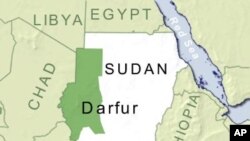Medical aid group Doctors Without Borders, says escalating violence in southern Sudan is not being met with adequate assistance from the humanitarian community. More than 2,200 people have died in southern Sudan from violence since the beginning of this year, a higher total than that found in Sudan's unstable western region of Darfur.
Doctors Without Borders reports a "disturbing deterioration" of security in southern Sudan, particularly in the Upper Nile and Jonglei states. It says its physicians have performed more surgical operations in these two states this year than they performed in all of South Sudan in 2008.
Doctors Without Borders chief of Sudan operations, Stephan Goetghebuer, says attacks in the region are becoming more violent. "Children are killed, women are killed. And we have seen attacks with only one survivor for 10 people killed, which is very abnormal for a looting attack."
The group is not the first to raise alarm that this year's violence is particularly unusual. Up to 250,000 have been displaced in the region.
The U.N. peacekeeping mission in Sudan has expressed concern over the number of women and children killed, and has warned that escalating instability could threaten free and fair elections in April.
The archbishop of the Episcopal Church in Sudan has also condemned some of the attacks as having hidden motives, saying the gunmen have the appearance of a well-funded and organized militia, rather than that of a band of cattle rustlers.
Doctors Without Borders says the international aid community in South Sudan is more focused on long-term development than emergency relief, priorities which it says need to be re-evaluated as violence in the region climbs.
Goetghebuer said, "There are a lot of benefactors of aid in southern Sudan; most of them are attacking the development issue. We believe that the humanitarian emergency response has not adapted to the level of need."
Southern Sudan has been at war for the most of the past 60 years. In 2005, a landmark peace deal ended the conflict between the North and South, granting the southern Sudanese rebels a semi-autonomous government and a share of positions in the national government.
National elections are to be held in April, followed by a crucial Southern independence referendum nine months later.
Doctors Without Borders is also treating victims of an outbreak of the deadly parasitic disease kala-azar, spread by sandflies. The disease is almost always fatal if left untreated.
The aid group says 75 percent if South Sudanese have no access to health care services.




